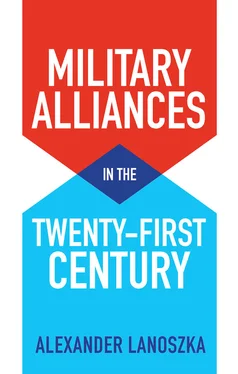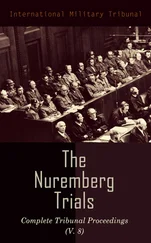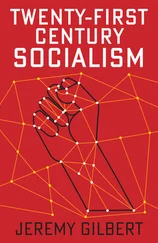1 Cover
2 Dedication Dedication Pour Maximilien, la source de ma joie
3 Title Page Military Alliances in the Twenty-First Century Alexander Lanoszka polity
4 Copyright Page Copyright Page Copyright © Alexander Lanoszka 2022 The right of Alexander Lanoszka to be identified as Author of this Work has been asserted in accordance with the UK Copyright, Designs and Patents Act 1988. First published in 2022 by Polity Press Polity Press 65 Bridge Street Cambridge CB2 1UR, UK Polity Press 101 Station Landing Suite 300 Medford, MA 02155, USA All rights reserved. Except for the quotation of short passages for the purpose of criticism and review, no part of this publication may be reproduced, stored in a retrieval system or transmitted, in any form or by any means, electronic, mechanical, photocopying, recording or otherwise, without the prior permission of the publisher. ISBN-13: 978-1-5095-4556-8 ISBN-13: 978-1-5095-4557-5 (pb) A catalogue record for this book is available from the British Library. Library of Congress Control Number: 2021939862 by Fakenham Prepress Solutions, Fakenham, Norfolk NR21 8NL The publisher has used its best endeavours to ensure that the URLs for external websites referred to in this book are correct and active at the time of going to press. However, the publisher has no responsibility for the websites and can make no guarantee that a site will remain live or that the content is or will remain appropriate. Every effort has been made to trace all copyright holders, but if any have been overlooked the publisher will be pleased to include any necessary credits in any subsequent reprint or edition. For further information on Polity, visit our website: politybooks.com
5 Tables and Figure Tables and Figure Table 0.1 Military alliances that are active as of 2021 Table 4.1 NATO military spending as percentage of GDP in 2019 Figure 4.1 Defense spending of select European NATO countries and the United States as a percentage of GDP (1949–2019)
6 Acknowledgments Acknowledgments In writing this book, I am most certainly standing on the shoulders of giants. I have never met Paul Schroeder, Glenn Snyder, or Patricia Weitsman, and, unfortunately, I will never be able to do so. However, their influence is everywhere in this book even if I am not referencing them directly. Their foundational scholarship has, collectively, been a rich source of inspiration and insight for me. Although this book synthesizes diverse areas of inquiry as regards alliance politics, it ultimately is but a small token of my own appreciation for their pioneering work. I owe a big debt of gratitude to Louise Knight for proposing the idea for this book in the first place and for pushing me to think hard about which arguments I would like to make. If it were not for her, then this book would surely not exist. I have had much help along the way while writing it. Inès Boxman shepherded the book through the review and publication process. Jordan Cohen offered excellent commentaries on drafts of each chapter. Bradley Sylvestre provided terrific research assistance. Because I wrote this book during the SARS-CoV-2 pandemic, I organized a virtual workshop on its first complete draft. Jordan Cohen, Katherine Elgin, Matthew Fay, and Michael Hunzeker gave incisive and excellent commentary that forced me to clarify and strengthen my arguments. I must also thank Hugo Meijer and Luis Simón for their comments on different parts of the manuscript. Very helpfully, two anonymous readers noted key weaknesses and made useful suggestions for remedying them. Over the years, too, I have absorbed much wisdom and knowledge from various teachers, mentors, friends, and colleagues at Princeton University, the Massachusetts Institute of Technology, Dartmouth College, City, University of London, and the University of Waterloo. They have opened up a diverse set of competing views and ideas relevant to the issues explored in this book. With all that said, I bear full responsibility for any infelicities and errors that sneaked into the finished product. Lastly, I would like to thank my wife, Emmanuelle Richez, for her extensive support and enthusiasm for the project, even if it meant enduring some of my long discourses over meals (what she would call “rants”). The writing of this book also overlapped with the arrival, and the first year in this crazy world, of our son Maximilien. This book is dedicated to him. His coming into our lives, the pandemic, and the writing of the book almost perfectly coincided in their timing. It was strange to be effectively in lockdown for such a long stretch of time, but he made the experience so much better for us. Windsor, Ontario
7 Introduction The Arguments of this Book Conventional wisdom #1: States form alliances to balance power and/or to gain influence over other states Conventional wisdom #2: The alliance dilemma is a fundamental problem shared by all military alliances Conventional wisdom #3: Members of US alliances must do more to bear their fair share of the common defense burden Conventional wisdom #4: Military alliances aggregate capabilities and thus allow their members to confront security challenges more effectively Conventional wisdom #5: Military alliances are only useful for as long as the strategic circumstances that led to their emergence hold Defining Military Alliances Plan of the Book
8 1 Formation Uncertainty, Violence, and Political Difference Balancing Threat as a Classic Explanation of Alliance Formation Concession-Extraction as Another Standard Explanation of Alliance Formation But Why Have an Alliance Treaty? Predicting Future Military Alliances
9 2 Entrapment What Is Entrapment? Treaty risks Systemic risks Reputational risks Transnational ideological risks Entrapment Risks in the Contemporary Era
10 3 Abandonment Abandonment: Natural, Rare, but Consequential What Shapes the Intensity of Abandonment Fears? Foreign policy interests The military balance Forward military deployments Can reliability be bought? Complications with Reassurance Fearing Abandonment in the Early Twenty-First Century
11 4 Burden-sharing Burden-sharing in Theory and History How Advances in Military Technology Shape Burden-sharing The growing complexity of conventional military power The paradoxes of nuclear weapons Burden-sharing Controversies in the Contemporary Era
12 5 Warfare What Is War and What Are the Trends in War? Why Take Part in Multilateral Military Operations? Why Military Effectiveness Is Hard for Military Alliances to Achieve Strategic factors Organizational factors Technical factors Coalition Warfare in the Contemporary Era
13 6 Termination How to Get Out of an Alliance via the Alliance Treaty Itself Fulfillment Military defeat Downgrading Unilateral abrogation Transformation The Analytical Importance of Understanding Alliance Termination
14 Conclusion Conventional wisdom #1: States form alliances to balance power, and/or to gain influence over other states Conventional wisdom #2: The alliance dilemma is a fundamental problem shared by all military alliances Conventional wisdom #3: Members of US alliances must do more to bear their fair share of the common defense burden Conventional wisdom #4: Military alliances aggregate capabilities and thus allow their members to confront security challenges more effectively Conventional wisdom #5: Military alliances are only useful for as long as the strategic circumstances that led to their emergence hold Military Alliances and World Order in the Twenty-First Century
Читать дальше












